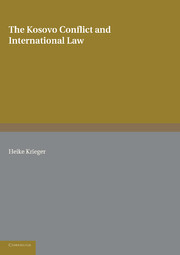Book contents
- Frontmatter
- Contents
- Map
- Preface
- Chronology
- Introduction
- Chapter 1 Kosovo's Status in Yugoslavia before 1999
- Chapter 2 Development of the Human Rights Situation pages 14 to 40
- Chapter 2 Development of the Human Rights Situation pages 41 to 64
- Chapter 2 Development of the Human Rights Situation pages 65 to 90
- Chapter 2 Development of the Human Rights Situation pages 90 to 114
- Chapter 3 Diplomatic Efforts for the Settlement of the Crisis pages 115 to 146
- Chapter 3 Diplomatic Efforts for the Settlement of the Crisis pages 147 to 187
- Chapter 3 Diplomatic Efforts for the Settlement of the Crisis pages 187 to 217
- Chapter 3 Diplomatic Efforts for the Settlement of the Crisis pages 218 to 253
- Chapter 3 Diplomatic Efforts for the Settlement of the Crisis pages 253 to 286
- Chapter 4 Military Action against Yugoslavia pages 287 to 313
- Chapter 4 Military Action against Yugoslavia pages 314 to 352
- Chapter 5 Settlement of the Crisis
- Chapter 6 Statement by NATO Memeber States
- Chapter 7 International Reactions to the Crisis pages 424 to 460
- Chapter 7 International Reactions to the Crisis pages 461 to 499
- Chapter 8 Court Action with regard to the Kosovo Crisis
- Chapter 9 Implementation of the Principles for a Political Solution of the Conflict
- Chronological List of Documents
- Select Bibliography
- Index
Chapter 3 - Diplomatic Efforts for the Settlement of the Crisis pages 115 to 146
Published online by Cambridge University Press: 05 July 2014
- Frontmatter
- Contents
- Map
- Preface
- Chronology
- Introduction
- Chapter 1 Kosovo's Status in Yugoslavia before 1999
- Chapter 2 Development of the Human Rights Situation pages 14 to 40
- Chapter 2 Development of the Human Rights Situation pages 41 to 64
- Chapter 2 Development of the Human Rights Situation pages 65 to 90
- Chapter 2 Development of the Human Rights Situation pages 90 to 114
- Chapter 3 Diplomatic Efforts for the Settlement of the Crisis pages 115 to 146
- Chapter 3 Diplomatic Efforts for the Settlement of the Crisis pages 147 to 187
- Chapter 3 Diplomatic Efforts for the Settlement of the Crisis pages 187 to 217
- Chapter 3 Diplomatic Efforts for the Settlement of the Crisis pages 218 to 253
- Chapter 3 Diplomatic Efforts for the Settlement of the Crisis pages 253 to 286
- Chapter 4 Military Action against Yugoslavia pages 287 to 313
- Chapter 4 Military Action against Yugoslavia pages 314 to 352
- Chapter 5 Settlement of the Crisis
- Chapter 6 Statement by NATO Memeber States
- Chapter 7 International Reactions to the Crisis pages 424 to 460
- Chapter 7 International Reactions to the Crisis pages 461 to 499
- Chapter 8 Court Action with regard to the Kosovo Crisis
- Chapter 9 Implementation of the Principles for a Political Solution of the Conflict
- Chronological List of Documents
- Select Bibliography
- Index
Summary
Early Attempts to Settle the Crisis
While the constitutional crisis in Kosovo has been worsening since 1988, the international community did not act before the dissolution of the SFRY. However, when armed conflict broke out in Croatia and subsequently in Bosnia and Herzegovina this conflict dominated the international agenda. In June 1991, Slovania and Croatia declared their independence. Fighting broke out in Slovenia and continued in Croatia. The European Union condemned the use of force by the Federation and urged the parties to agree to a peace conference sponsored by the EU. The conference was convened in The Hague on 7 September 1991 under the chairmanship of Lord Carrington with the aim to create a peaceful resolution of the conflict. During the conference a framework for the settlement of the Yugoslav crisis as a whole was drafted. The proposal suggested the forming of autonomous regions or special status areas, applying, “in particular, to the Serbs living in areas in Croatia where they form a majority.” Without mentioning Kosovo and Vojvodina, the draft also proposed that “the republics will apply fully and in good faith established provisions for the benefit of ethnic and national groups, and for autonomous provinces which were given a special constitutional status” (document no. 50 a). Thus, however, it was not clear whether the constitutional changes of 1989/90 were accepted by the international community because they were not mentioned. The second draft of the Carrington plan became more precise in its refutation of the constitutional amendments stressing that "the republics shall apply fully and in good faith the provisions existing prior to 1990 for autonomous provinces" {document no. 50 b).
- Type
- Chapter
- Information
- The Kosovo Conflict and International LawAn Analytical Documentation 1974–1999, pp. 115 - 146Publisher: Cambridge University PressPrint publication year: 2001



